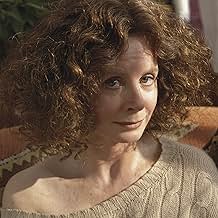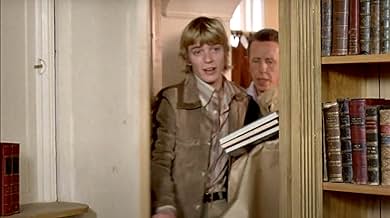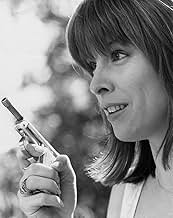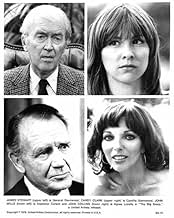Füge eine Handlung in deiner Sprache hinzuA grizzled American private detective in England investigates a complicated case of blackmail-turned-murder involving a rich but honest elderly general, his two loose socialite daughters, a ... Alles lesenA grizzled American private detective in England investigates a complicated case of blackmail-turned-murder involving a rich but honest elderly general, his two loose socialite daughters, a pornographer, and a gangster.A grizzled American private detective in England investigates a complicated case of blackmail-turned-murder involving a rich but honest elderly general, his two loose socialite daughters, a pornographer, and a gangster.
- Regie
- Drehbuch
- Hauptbesetzung
- Karl Lundgren
- (as Simon Turner)
Empfohlene Bewertungen
In addition, Chandler's convoluted plot (originally derived from two or three separate short stories) didn't offer an easy screen translation, even before all the "juicy parts" were excised.
So this must have seemed like a great idea. Robert Mitchum had successfully played Philip Marlowe a few years earlier in "Farewell, My Lovely", and the MPAA ratings system meant that they could be as explicit as they wanted; the filmmakers could be more faithful to Chandler's novel *and* show us Candy Clark nude! How could we go wrong?
In lots of ways, unfortunately. First up, Mitchum didn't seem to fit the role of Marlowe nearly as well in this movie as he did in "Farewell, My Lovely". This makes me suspect that the earlier story was more deftly tailored to Mitchum's age and acting style, with lots of references to how old and tired Marlowe feels. In this case, the script sticks very closely -- basically scene-by-scene, almost line-by-line -- to the original novel, but Mitchum doesn't fit the part as well, somehow. In the book, Marlowe was very much "in your face", giving a hard time to everyone from the cops to Eddie Mars to the Sternwood girls. That means that in this movie, Mitchum's nonchalant style doesn't fit with many of the scenes he has to play. Bogart was "nonchalant" too, I guess, but in a different way. Bogie's tough guys would feign casualness, but they always seemed like they were waiting for the other guy to start something, and when Bogart dug in and got to work, he took it seriously. Mitchum just seems like he couldn't care less one way or the other. It doesn't work for this story, where the second half is driven by Marlowe's desire to find out the truth even when he isn't being paid to do so.
The move from L.A. to London didn't bother me at all. It made an interesting, coincidental "bridge" between the classic films noir and more recent movies about London gangs like "Snatch".
But the deepest problem with this film is that while it follows the externals of Chandler's novel much more closely in terms of the plot and (most of) the dialogue, it fails utterly to capture the real heart and soul of the novel. Of course, the earlier movie version did, too -- this novel may well be unfilmable -- but at least it had Bogie and Bacall. This one has Mitchum and Miles. And Candy Clark nude. And not much else.
Take a look at the beginning of the movie. The second scene, where Marlowe visits General Sternwood in the greenhouse, is probably one of the classics of 20th century popular literature. Few other novels begin with a scene which so completely evoke their characters, and atmosphere, as Marlowe sweats, gags on the scent of orchids, and converses with a tired, bitter, old, rich man clinging to his miserable life. Chandler is hitting you hard with every trick in his bag, and his timing, dialogue and characterization are flawless. Howard Hawks' screenwriters were smart enough to leave much of his original dialogue in this scene. By contrast, in the Mitchum film, scene after scene features lines taken verbatim from the novel, but for some reason, they chose to leave out some of the best: "How do you like your brandy, sir?" "Any way at all." or the all-time classic, "A nice state of affairs when a man has to indulge his vices by proxy". If the screenwriters chose to leave in lines about Pekineses and loogans, how could they possibly leave these ones out?
Maybe they thought that such lines wouldn't sound right coming out of James Stewart -- they were probably right -- but that just shows what an inept choice he was for this part. General Sternwood is supposed to be incredibly bitter, yet we're given a typical Stewart performance; he almost looks perky, certainly not broken by life. He looks physically weak but hardly seems cynical or jaded enough to have produced two such screwed-up daughters. It wasn't even made clear why he was sitting out in the greenhouse, and Marlowe doesn't seem particularly uncomfortable while he's out there (although a later reference to Rusty Regan "sweating like a pig" is left in). It's just a mess, and does nothing at all to set us up for what follows.
To cite one further example, another key scene manages to miss the point completely while still following Chandler's plot closely. The scene where Harry Jones finally approaches Marlowe in Marlowe's office is the turning point of the entire novel. The case is closed, Marlowe is literally signing the check to deposit it, and Jones walks in with the exact piece of information Marlowe's been missing the entire time. Like so many scenes in the novel, this one is simply brilliant, overflowing with great dialogue ("She's too big for you"), and in some ways tying together the entire story. Yet after following most of the scene very closely, the script inexplicably stops short of some of Chandler's best writing:
"'This Regan was a cockeyed sort of buzzard. He had long-range eyes. He was looking over into the next valley all the time. He wasn't scarcely around where he was. I don't think he gave a damn about dough. And coming from me, brother, that's a compliment.'
"The little man wasn't so dumb after all. A three for a quarter grifter wouldn't even think such thoughts, much less know how to express them."
The filmmakers may have closely followed the plot of the original novel in this version, but the fact that they could leave out writing like this, while clinging almost religiously to most of the rest of the book, shows that they couldn't have been more clueless about the real "core" of Chandler's writing. Alas, it appears that we are still waiting for the definitive movie version; this one manages to reduce "The Big Sleep" to a barely-above-average TV movie-of-the-week with Candy Clark, nude.
That's where the 1978 version excels - and fails. Let's start with the fails. In the original, the scenes in the bookshops near the beginning rule with Bogie's use of humour and the electric suggested tryst with Dorothy Malone's character. Sometimes the suggestion can be erotic enough. Perhaps that's why this version skips the fun and the implied sex for another more mundane approach.
The other fail is the atmosphere. This version lacks any. The original's shadows and textures evoked each scene and created moods. This version lacks any specific mood to instead tell a story in almost a heightened reality. The direction does the same, relying on straight-ahead narrative more like a TV movie than a theatrical film.
There's so much more here that succeeds. Despite his age, Mitchum is a fine Marlow, more cynical and world-weary than Bogart's version. The script is sharp, full of humour and wry observations. The biggest improvement is the depiction of sex. Freed of the tyranny of the forties' censorship, scenes like Carmen naked and stoned are much more realistic and make a more satisfying treatment, even if the innuendo is not as predominant.
OK, it's not the classic it could've been. It's still a decent flick to rent or watch on cable. Marlowe is solid, Candy Clark is wonderfully loony, Joan Collins is pure kitsch, Richard Boone plays the essence of evil. It's good to see James Stewart, even if his gentle disposition doesn't quite match the demeanour of a General. The supporting cast are almost uniformly intriguing and fun to watch. And what a cast!
The Big Sleep may be no masterpiece but it is great fun. Relax your expectations and enjoy it for what is - fine entertainment.
But Richard Amsel's poster is great!
The plot broadly follows that of the 1946 film, with the striking exception that the action takes place in London rather than Los Angeles. This does not, however, mean that the original has been completely anglicised. Both Philip Marlowe and General Sternwood are American expatriates living in London rather than Englishmen, and they are played by two of Hollywood's biggest stars, Robert Mitchum and James Stewart. With the exception of Richard Boone as Canino and Candy Clark as Sternwood's younger daughter, the other main parts are all played by British actors.
The film was clearly made as homage to the famous Humphrey Bogart classic, and it is inevitable that comparisons will be made between the two. In some respects, in fact, the later film is superior to, or at least as good as, the earlier one. (I have not read Raymond Chandler's novel, so I cannot say which film is closer to the original source material). The 1946 film is a fine one, but it is not perfect and has a number of weaknesses, not least its insanely complicated plot containing threads that are never developed and events that are never explained. The plot of the 1978 film, while complex enough, is somewhat easier to follow than that of its predecessor. To the purist Bogart fan there can be no substitute for the original, but to anyone else Robert Mitchum, himself a fine exponent of the film noir style during the early part of his career in the forties and fifties, seems like the best possible replacement. He is, of course, older than Bogart was when he played the role, and his portrayal of the character is perhaps less cynical and more thoughtful, but it is a perfectly acceptable interpretation. There are also good performances from Stewart in the cameo role of Sternwood, from Oliver Reed and from Joan Collins.
As a whole, however, the film does not live up to the standard of the original. Certainly, not all the actors are as good as their 1946 counterparts (Sarah Miles, for example, is no Lauren Bacall), but the main reason for its comparative failure goes deeper. The Bogart movie is perhaps the quintessential film noir, a film that one watches less for its plot, or even for its acting, than for its unique atmosphere of cynicism, menace and dubious glamour. An important factor in creating that atmosphere is its dark, brooding black-and-white photography. Unfortunately, in the late seventies the use of black-and-white was generally regarded as the equivalent of hanging a sign on the cinema door saying 'Warning! Art-house Movie! Intellectuals Only!' A few established auteur directors such as Woody Allen ('Manhattan') and Martin Scorsese ('Raging Bull') could get away with using monochrome, but there was no way that the studio would allow such latitude to Michael Winner, a director generally associated with violent commercial thrillers. So colour it had to be. In fact, the photography of London and the English countryside is quite attractive, but it is no substitute for the authentic film noir look.
I mentioned that the atmosphere of the earlier film was also one of dubious glamour; besides Bacall it has a large number of other strikingly beautiful but sinister women (some of them only in minor roles). The later film cannot compete in this respect. With the exception of Joan Collins (who could do sultry but sinister glamour in spades, even in her mid-forties), none of the female characters has the required touch of the femme fatale about her.
As a London-based crime thriller, Winner's 'The Big Sleep' is not a bad film; it is better than most of its director's other thrillers and better than a lot of other British films from the seventies. As homage to its namesake, however, it falls some way short of its aims. 6/10
Wusstest du schon
- WissenswertesJames Stewart had difficulty saying his lines on time due to hearing and possibly memory problems. Some of the cast were shocked by his aged appearance. Robert Mitchum recalled, "The picture was all about corpses, but Jimmy looked deader than any of them." Stewart actually outlived Mitchum by one day, nearly 20 years later.
- PatzerWhen Marlowe takes the gun from Camilla after she unloads it on him with multiple blank rounds, he grabs the barrel with his bare hands. That should have proved to be very painful as the barrel would be extremely hot.
EDIT: This is incorrect. Blank cartridges in a small calibre gun will not heat the barrel to any great extent. A gun barrel gets hot mainly due to the friction of the bullet going through the barrel, not from the powder in the cartridge.
- Zitate
Charlotte Sternwood: [when Marlowe declines to blackmail her] Wha-? You don't want money?
Philip Marlowe: Oh sure. All I itch for is money. I'm so greedy that for fifty pounds a day plus expenses on the day I work, I risk my future, the hatred of the cops, of Eddie Mars and his pals, I dodge bullets and put up with slaps and say "Thank you very much. If you have any further trouble please call me: I'll just put my card here on the table." I do all that for a few pounds. And maybe just a little bit to protect what little pride a sick and broken old man has in his family, so that he can believe his blood is not poisoned. That his little girls - though they may be a trifle wild - are not perverts and killers.
- VerbindungenFeatured in James Stewart, Robert Mitchum: The Two Faces of America (2017)
Top-Auswahl
Details
- Erscheinungsdatum
- Herkunftsländer
- Sprache
- Auch bekannt als
- Tote schlafen besser
- Drehorte
- Knebworth House, Knebworth, Hertfordshire, England, Vereinigtes Königreich(Sternwood Mansion)
- Produktionsfirmen
- Weitere beteiligte Unternehmen bei IMDbPro anzeigen
Box Office
- Budget
- 3.000.000 £ (geschätzt)
Zu dieser Seite beitragen






































